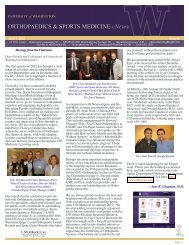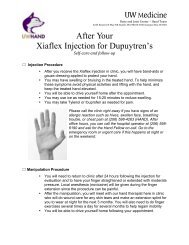Ream and Run for Shoulder Arthritis: Conservative Reconstructive ...
Ream and Run for Shoulder Arthritis: Conservative Reconstructive ...
Ream and Run for Shoulder Arthritis: Conservative Reconstructive ...
You also want an ePaper? Increase the reach of your titles
YUMPU automatically turns print PDFs into web optimized ePapers that Google loves.
<strong>Shoulder</strong> & Elbow Service, University of Washington Department of Orthopaedics <strong>and</strong> Sports Medicine<br />
Who Should Consider A <strong>Ream</strong> And <strong>Run</strong>?<br />
Surgery <strong>for</strong> shoulder arthritis should only be considered when the arthritis is limiting the quality<br />
of the patient’s life <strong>and</strong> after a trial of physical therapy <strong>and</strong> mild analgesics to determine if<br />
non-operative management is sufficiently helpful. Severe arthritis is usually best managed by<br />
a joint replacement, either a total shoulder or a ream <strong>and</strong> run. The <strong>Ream</strong> <strong>and</strong> <strong>Run</strong> procedure<br />
is considered by those who are strongly motivated to put in substantial time <strong>and</strong> ef<strong>for</strong>t in the<br />
rehabilitation process to assure that proper healing occurs <strong>and</strong> who recognize that the pain<br />
relief <strong>and</strong> range of motion achieved with this procedure may not match that of a conventional<br />
total shoulder replacement. The ideal patient is healthy, active, <strong>and</strong> committed to work diligently<br />
to achieve a shoulder reconstruction that does not require plastic <strong>and</strong> bone cement.<br />
A patient who has had a terrific recovery after this procedure states “R&R patients must be<br />
very motivated to endure the challenges of the rehab. I don’t think that this can be overstated.<br />
It is most certainly a tough, painful, <strong>and</strong> lengthy process, but most definitely worth it. As they<br />
say, ‘The juice is worth the squeeze,’ but patients must prepare themselves mentally <strong>for</strong> the<br />
journey <strong>and</strong> be willing to put in the work.”<br />
Who Should Probably Not Consider A <strong>Ream</strong> <strong>and</strong> <strong>Run</strong>?<br />
This procedure is less likely to be successful in individuals with rheumatoid arthritis, depression,<br />
obesity, diabetes, Parkinson’s disease, multiple previous shoulder surgeries, shoulder<br />
joint infections, rotator cuff deficiency <strong>and</strong> severely altered shoulder anatomy. Patients who<br />
routinely use narcotic medication or who use tobacco are generally not c<strong>and</strong>idates <strong>for</strong> this<br />
procedure.<br />
What Are The Keys To Success Of A <strong>Ream</strong> <strong>and</strong> <strong>Run</strong>?<br />
Success requires technical excellence of the surgery <strong>and</strong> a steadfast commitment by the patient<br />
to the exercise program until the desired range of motion can be achieved com<strong>for</strong>tably.<br />
Attaining <strong>and</strong> maintaining at least 150 degrees of <strong>for</strong>ward elevation is critical to the success<br />
of this procedure. Patients point out that the recovery is progressive – often the shoulder continues<br />
to improve as long as two years after surgery.<br />
How Does A Patient Prepare For The <strong>Ream</strong> <strong>and</strong> <strong>Run</strong> Procedure?<br />
As <strong>for</strong> all elective surgical procedures, the patient should be in the best possible physical<br />
<strong>and</strong> mental health at the time of the procedure. Any heart, lung, kidney, bladder, tooth, or<br />
gum problems should be managed be<strong>for</strong>e surgery. Any infection may be a reason to delay<br />
the operation. Any skin problem (acne, scratches, rashes, blisters, burns, etc) on the shoulder,<br />
armpit, arm, <strong>for</strong>earm or h<strong>and</strong> should be resolved be<strong>for</strong>e surgery. The shoulder surgeon<br />
needs to be aware of all health issues, including allergies as well as the non-prescription <strong>and</strong><br />
prescription medications being taken. For instance, aspirin <strong>and</strong> anti-inflammatory medication<br />
may affect the way the blood clots. Some medications, such as blood thinners, may need to<br />
be modified or stopped be<strong>for</strong>e the time of surgery.















